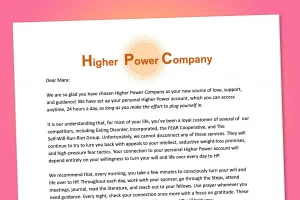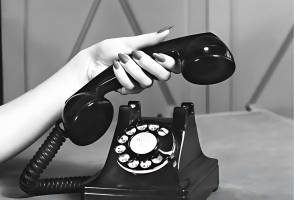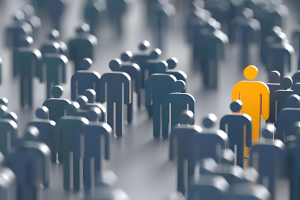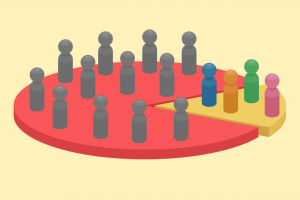Very simply, that Power is OA. Here is a Fellowship that has many members working together to not eat compulsively, and every time I go to a meeting I see evidence that it works.
I rarely use “agnostic” or “atheist” to describe myself, and the question “Is there a God?” is not one I give much thought to. Many people have religious or spiritual answers, others have scientific theories, and it’s clear they believe these narratives with passion and certitude. But I came to believe it would be intellectual arrogance for me to feel I have even a clue about how the universe works.
A speaker at an OA retreat shared this analogy: Imagine a goldfish in a bowl watching its world happen. Sometimes lights come on; other times it’s dark. Sometimes bits of food drop into the bowl. Sometimes the water is clean; sometimes it isn’t. Imagine the goldfish with its little brain trying to understand what’s going on: A pet owner controlling electricity? Offering manufactured fish food from a pet store? Periodically changing the entire environment using clean water from pipes? That little fish wouldn’t have the slightest chance of understanding as much as we do, and we humans have only been civilized for about 10,000 years on a 4.5-billion-year-old planet, part of one little solar system out of many trillions. It seems to me that thinking, believing, and claiming we know how it all works makes as much sense as that goldfish knowing the greater story.
I joined OA more than twenty-seven years ago, and I feel very grateful that for much of that time I’ve been able to keep off 150 pounds (68 kg) and refrain from compulsively overeating. A critical part of that has been working the Twelve Steps of OA, which has been a challenge because if I simply have no idea how the world works, and suspect that nobody else does either, how can I work the Steps with their many references to God?
God comes up a lot in program. While OA literature indicates we can choose our own definition of a Higher Power, the more frequent message suggests that the way to recover is to find God and turn your life over to him. It feels like the program is politely letting nonbelievers join the club, providing they know they need to buy into God or similar down the road. I recoiled at this language for years (and sometimes still do). I came from a very orthodox religious childhood, and it took quite a bit of searching to come to my current worldview. But I want to abstain from compulsive overeating, so here’s how I work OA without a God story.
In Step One, I know there’s a power that can make my life unmanageable: compulsive overeating, aka binge foods and behaviors. In Step Two, I have to look for a Power stronger than food.
Very simply, that Power is OA. Here is a Fellowship that has many members working together to not eat compulsively, and every time I go to a meeting I see evidence that it works. I just need to be open to the idea that there is something more powerful than the compulsion to overeat. What I call it or how it works is not important. For me, OA is a Power greater than me. When two or more people come together to help each other, their combined effort is more powerful than individual efforts alone. Put quite clearly, I can’t stop overeating, but we can.
When I started, I was told all Step Three had to mean was committing to keep working the Steps. I did that, and it was a great choice. I am still exploring and finding now that Step Three is also managing the “me-we balance,” that is, taking care of myself while also interacting with others. I eat right, sleep, exercise, earn a living, and have some fun, and I regularly review how much I can serve the world around me. Service happens at a host of levels: listening to my sweetie, trying to do right in my professional life, giving OA service, supporting causes I believe in, being thoughtful of the environment, and more. Managing the me-we balance helps me be part of the world instead of lost in a world of self-centeredness.
Step Four is simply a thorough inventory of my morality, and Step Five the sharing of it. The sharing and self-reflection have worked quite well for me; this is a “we” program.
When I got to Step Six and heard the term “defects of character,” I preferred the interchangeable term, “instincts gone astray” (AA Twelve Steps and Twelve Traditions, p. 50). When my natural instincts for safety, society, and self actualization get out of balance on the me-we spectrum, it can create havoc. I experience Step Six as realizing I’m out of balance, desiring to change, and being ready to come back into balance. Step Seven is using the program, my efforts, and any other helpful resources to re-balance. If I’m plagued by greed, resentment, or pride, I need to move in the opposite direction and cultivate generosity, kindness, and humility. Again, this is where the “we” part comes in. I can’t do it alone; I need help that can come from OA sponsors, other members, professionals, friends, family members, and more. These changes take time, and often it’s a lifelong journey to keep moving toward balance. OA is a program of progress, not perfection.
Step Eight is very straightforward: for me, willingness is linked to abstinence. If I want to stay abstinent, I have to forgive and get ready to make amends. Step Nine though, was quite intimidating: my list had over seventy items on it! In order to survive a very difficult childhood, I’d learned that getting my needs met at any cost was the way to survive, so I gave little or no thought to how my behaviors affected others. If I was going to make these seventy-plus amends, I had to change my fundamental worldview and move from a me focus to a we focus. I now choose to consider others in my choices as I work on balance and progress. And I treat Step Ten as a mini-version of Steps Four through Nine, described above.
Step Eleven is probably the most challenging Step for someone who does not believe in God, understand God, pray to God, believe that God has any will for us, or believe that God provides power to those who pray to him. It’s a tall order for me, so for many years I have used meditation in its various forms. I do it, not to communicate with God or become spiritual, but because I think it helps give me some inner peace and is good for my general well-being. There are many ways to meditate; I find whatever seems helpful, then do it as long as that holds true. Right now, I meditate on mindfulness with a recording to guide me, bike while listening to affirmation music, work on being present in my life, read OA literature, meditate at my OA meetings, and practice mindful eating, where I am present to the taste and texture of my food as I chew slowly. Sometimes I say the OA prayers simply because I enjoy that. When I hear the God word, I think about it being an acronym for either Good Orderly Direction or Great Out Doors. When I was into dance, it was an acronym for Go Out Dancing.
Finally, for Step Twelve, the “spiritual awakening” means I have found a way of living that allows me to not compulsively overeat, one day at a time. It’s that simple. To me, the important part of this Step is to carry the message to others and live a life of OA Principles; in short, to keep working on the me-we balance. The world is not just about me or you; it is about us.
—Alan





